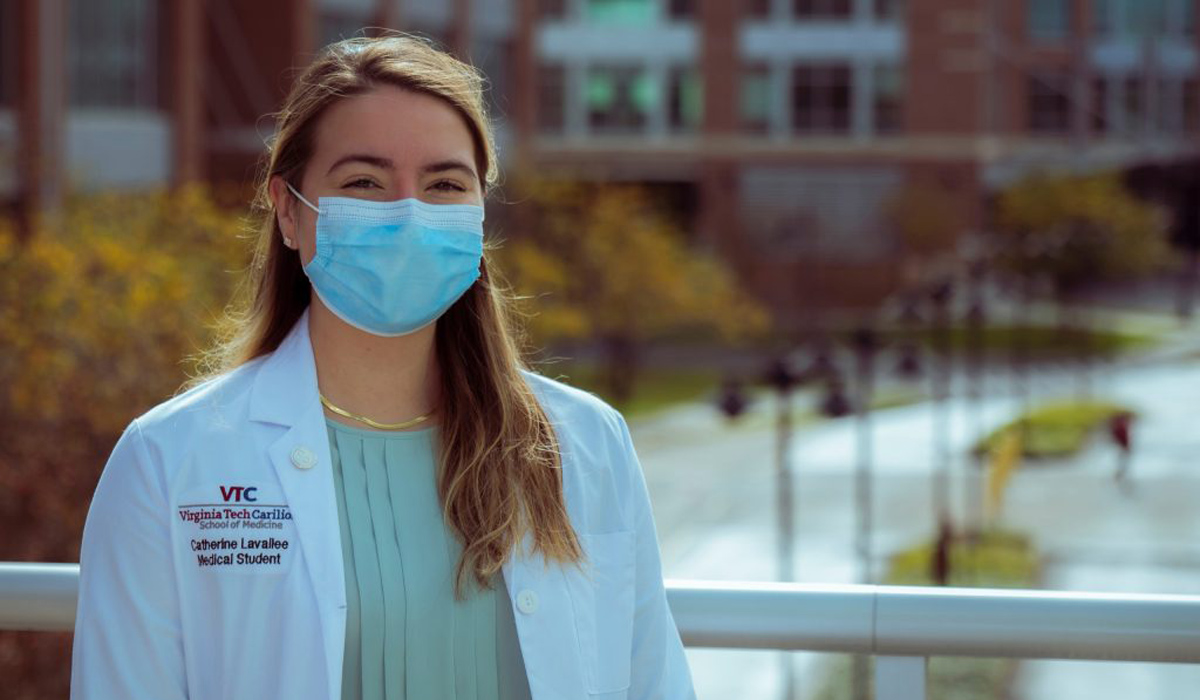

Catherine Lavallee knew medical school would be challenging even for healthy individuals, but that didn’t stop her from pursuing her dream while living with an autoimmune disorder that can sometimes leave her in acute pain.
Diagnosed with juvenile idiopathic arthritis (JIA) at age 5, Lavallee lives with sudden and severe onset of symptoms, known as flares, which cause inflammation and joint pain.
“It can be strange to come straight from a doctor’s appointment to a clinical science class where we are learning how to take a patient’s history and talk like a doctor, since I am both a medical student and a patient,” said Lavallee, a first-year student at the Virginia Tech Carilion School of Medicine. “It’s a unique perspective to bring to medical school, and it provides me with a lot of motivation.”
Lavallee graduated from The Catholic University of America in 2018 with a major in biology and a minor in philosophy. She spent two years working in the immunology division at Boston Children’s Hospital as lab manager and research assistant for the Oyoshi lab before arriving in Roanoke last summer to start medical school. In Boston, she researched pediatric food allergies; specifically, the compounds in breast milk that protect babies against developing food allergies.
Lavallee attributes her time at Boston Children’s as her introduction to the type of doctor that she hopes to be in the future. She is one of the first two recipients of the Dr. and Mrs. Robert R. and Rebecca Bowen Memorial Scholarship, a legacy gift from the family of Bowen, a Virginia Tech alumnus and orthopedic surgeon, and his wife.
“Learning about the scholarship was a big surprise,” she said. “I was humbled to be selected, and it made me feel the full weight of support from VTC. I am so grateful that my perspective is respected and valued.”
Drawing from her own experiences of growing up with a chronic illness, as well as those of her younger brother with autism, Lavallee holds a particular interest in persons with disabilities. She has a drive to make sure each person is heard and understood by those who treat them.
“I really believe in the value of all human life and equity for all people, with and without disabilities,” she said. “And while I don’t hide behind my illness, I think it’s important to have representation of chronic disease and disability in the practice of medicine. I would like to use my experience to let other people know that it is possible to go into the field of medicine, and it is important to be represented there.”
Lavallee’s passion and first-hand experience have led her to the role of patient consultant with the Childhood Arthritis and Rheumatology Research Alliance (CARRA), a research network where she especially feels her voice is heard. She is part of a group of patients who help guide research committees as to what are the most beneficial research directions from a patient point-of-view and helps provide patient input to the informational materials and study design used in new clinical trials. She said that if her experience can help even one child diagnosed with JIA in the future, then it will be worth it.
While in Boston, Lavallee spent a year as a volunteer live-in counselor at the Wellmet Project, providing peer-to-peer modeling to people with psychiatric conditions who are preparing to live independently.
“This position was similar to being a resident assistant in a dorm, so in addition to being fun, it also was a privilege to get to know the residents so well,” she said. “When you live with people, you really understand their day-to-day lives, both the challenges and the victories.”
Lavallee said this is where she learned the power of simply listening, which is something she plans to bring to her future practice.
The Virginia Tech Carilion School of Medicine was Lavallee’s first choice when applying to medical schools mainly because of the school’s research program. The school is one of only a few in the country that provides a rigorous longitudinal research program built into its curriculum. From her experience shadowing physician-scientists at Boston Children’s Hospital, Lavallee felt having a research-centric practice would make her a better doctor someday. She was also intrigued by opportunities to pursue other medically related master’s and doctorate degrees through the university.
In addition, Lavallee sought out a school where she felt the faculty would understand and care about her success.
“I needed a school that was close-knit and would be able to work with me and my illness,” she said. “It’s confusing to people. On the outside, I look fine, but a flare can cause me to need to retreat and rearrange priorities. I’m so grateful for the compassionate and understanding faculty and fellow students at VTC.”
Lavallee has a lot of specialties that interest her but expects to work with the pediatric population in the future and would someday like to settle in an underserved area such as Southwest Virginia.
“Rural communities have a disadvantage when it comes to accessing to medical care, particularly medical specialties such as pediatric rheumatology.”
Halfway through her first year of medical school, Lavallee looks forward to the future with the other 47 members of her class. She is excited to begin working with her research mentor investigating how immune components in breast milk are related to brain and behavioral development in infants.
“I’m really grateful for the group of people that VTC attracted,” she said. “After all of the preparation that goes into becoming medical students, it is a pleasure to finally be here studying. Already learning from patient experiences in our problem-based-learning class, we are beginning to prepare to see and hear future patients. I know that sharing my perspective with fellow classmates will help in the process of shaping us to be compassionate medical professionals in the future.”
Story and photo originally appeared on the Virginia Tech website — republished with permission.